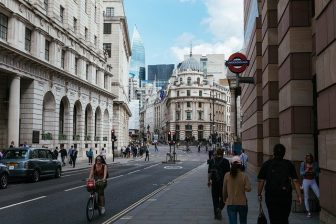 The Bank of England is today expected to raise interest rates to their highest level since 2009, as the central bank looks to tackle soaring inflation, while not exacerbating the UK economic slowdown.
The Bank of England is today expected to raise interest rates to their highest level since 2009, as the central bank looks to tackle soaring inflation, while not exacerbating the UK economic slowdown.
Mortgage holders, house hunters and savers will be affected by the Bank of England’s expected decision to increase the rate from 0.75% to 1%.
Many financial analysts were predicting that the Bank of England’s Monetary Policy Committee would raise rates by half a percentage point today. However, many have shown signs of revising their calculations down in recent days, with most economists now predicting a 0.25% rise in light of the slowing UK economy.
The consensus among economists is that the MPC will decide to act cautiously as UK households are squeezed by inflation, leading to lower demand and slower economic growth.
“Our view is that the Bank of England is having to thread the eye of a needle when it comes to tackling the current inflation surge such that it doesn’t induce a recession, meaning that relevant caution is required,” Simon Harvey, head of FX analysis at Monex Europe, said.
“Therefore, we don’t think the BoE will conduct a 50bp hike at any of its remaining meetings this year unless there is substantial evidence showing wage growth is responding to rising price pressures,” he added.
There are clear indications that inflation is starting to adversely affect economic activity. UK retail sales data for March showed volumes dropped by a more than expected 1.4%.
Growth in gross domestic product slowed to just 0.1% in February, from 0.8% a month earlier.
Chris Hare, economist at HSBC, commented: “There is a growing argument that the energy shock driven inflation of today — to the extent that it squeezes on real incomes — means lower inflation tomorrow.”


Is the BoE monetary committee so removed from the real world they don’t actually understand what is going on, or is it me? I’m happy for it to be either.
The cost of living crisis has nothing to do with an increase in demand for anything. Fuel and food prices have shot up (and will continue to do so) for a number of reasons including what is happening in Ukraine. People are suffering the consequences of that through higher prices but the BoE will apparently make things worse by hiking borrowing rates. What effect will that have on the factors causing the problem?
You must be logged in to like or dislike this comments.
Click to login
Don't have an account? Click here to register
Low interest rates fuel inflation by inflating asset prices and creating more spending. Cheap borrowing has pushed property prices up, cheap borrowing has allowed car sellers to get £30,000 for cars that used to sell for £19,000. There is an inflationary pressure that will only compound if someone doesn’t control the appetite to spend.
Low interest rate policies might be good for governments that have borrowed beyond their means but it denies them the early opportunity to control inflation. Consumer spending and low levels of unemployment are two recognised inflationary pressures that have gone unchecked.
Buckle up- there is some turbulence ahead.
You must be logged in to like or dislike this comments.
Click to login
Don't have an account? Click here to register
Still astounded by “economists” who didn’t see this coming. You cannot just print add 20% – 40% extra supply of money by quantative easing and expect things to be OK
I am just an estate agent, yet 3 years ago I was thinking to myself, and a lot of my peers also, that some serious inflation would be as a result of this, yet the professional money figureheads are all scratching their heads like this is a surprise!
You must be logged in to like or dislike this comments.
Click to login
Don't have an account? Click here to register
it was apparent from April 2014 something was not as it should be. Mark Carney had previously said he would raise bank lending rates once unemployment dropped below 7%. When that didn’t happen the BOE was diverted from a known path and economic strategies.
The gap between the haves, the have nots and the hads might be about to become very wide indeed. It is easy to see how people who have retired early on a wave of false affluence might now get caught out by difficult to control inflation. Final pension salary schemes will be very quickly caught off guard by 7% inflation especially if it sustained for 5 or more years
You must be logged in to like or dislike this comments.
Click to login
Don't have an account? Click here to register